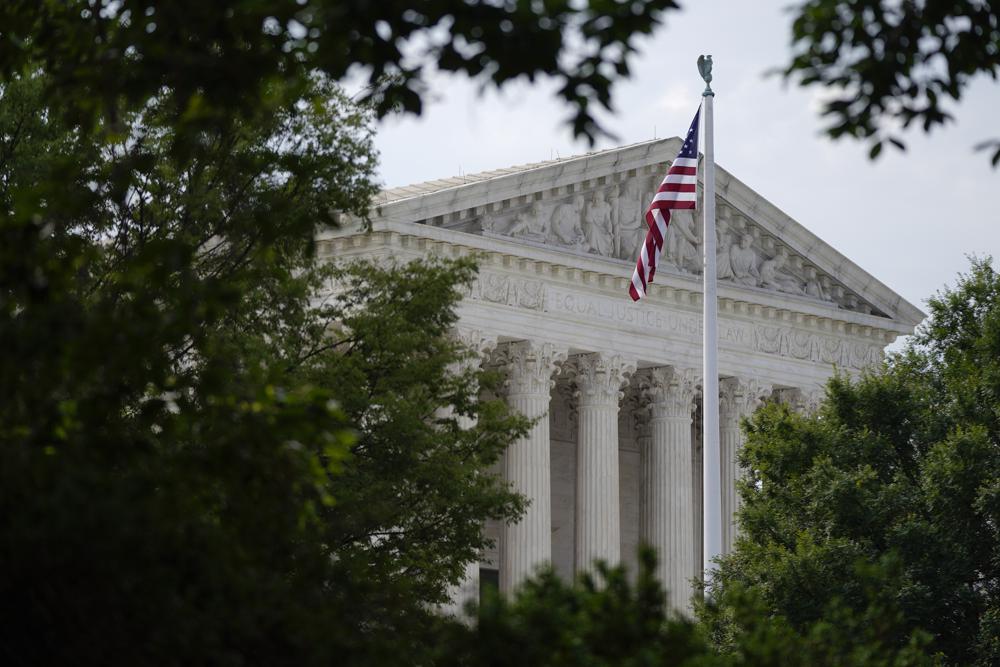The Supreme Court on Monday sided with a football coach from Washington state who sought to kneel and pray on the field after games.
The court ruled 6-3 along ideological lines for the coach. The justices said the coach’s prayer was protected by the First Amendment.
“The Constitution and the best of our traditions counsel mutual respect and tolerance, not censorship and suppression, for religious and nonreligious views alike,” Justice Neil Gorsuch wrote for the majority.
The case forced the justices to wrestle with how to balance the religious and free speech rights of teachers and coaches with the rights of students not to feel pressured into participating in religious practices. The outcome could strengthen the acceptability of some religious practices in the public school setting.
The decision is also the latest in a line of Supreme Court rulings for religious plaintiffs. In another recent example, the court ruled that Maine can’t exclude religious schools from a program that offers tuition aid for private education, a decision that could ease religious organizations’ access to taxpayer money.
That the court ruled for the coach is perhaps not surprising. In 2019, the court declined to take up the case at an early stage, but four of the court’s conservatives agreed that a lower court decision in favor of the school district was “troubling” for its “understanding of the free speech rights of public school teachers.”
The case before the justices involved Joseph Kennedy, a Christian and former football coach at Bremerton High School in Bremerton, Washington. Kennedy started coaching at the school in 2008 and initially prayed alone on the 50-yard line at the end of games. But students started joining him, and over time he began to deliver a short, inspirational talk with religious references. Kennedy did that for years and led students in locker room prayers. The school district learned what he was doing in 2015 and asked him to stop.
Kennedy stopped leading students in prayer in the locker room and on the field but wanted to continue praying on the field himself, with students free to join if they wished. Concerned about being sued for violating students’ religious freedom rights, the school asked him to stop his practice of kneeling and praying while still “on duty” as a coach after the game. The school tried to work out a solution so Kennedy could pray privately before or after the game. When he continued to kneel and pray on the field, the school put him on paid leave.
Three justices on the court attended public high schools themselves while the rest attended Catholic schools.
The case is Kennedy v. Bremerton School District, 21-418.
(AP)












4 Responses
We want a legal system that protects the right to be religious openly. We don’t want laws banning, for example, wearing a yarmulke in public (which, several major democracies with large Jewish communities have, at least for government employees while employed). The secular fanatics (a disproportionate number of whom are descended from OTD Jews) want a world of state-mandated secularism, and rather than the American tradition of “Freedom OF Religion” want coercive “Freedom FROM Religion”. This court case was a severe blow against them.
Boruch Hashem, yet another wonderful decision from this wonderful court. The radical atheists who pretend to speak for the Jews are all shocked and outraged. The AJC, the ADL, the Deformed religion, all the enemies of Hashem, who have less in common with Judaism than do most forms of Xianity. They want the USA to be actively anti-religion, when the constitution clearly says the opposite, that it is pro-religion.
“Separation of church and state” is not mentioned in the constitution, not even once. It was introduced into US jurisprudence by the Klansman Hugo Black in the 1940s, and it needs to be beaten down and eliminated. So long as there is no official state religion, and all people are equally free to practice their religious beliefs no matter what they are, there is no “separation”.
So the Supreme Court rules that we have a right to pray on the football field, but refuses to hear that going to a house of worship is a sensible part of religious expression. It’s not much of an improvement on state mandated secularism.
Milhouse: “Separation of church and state” is directly mentioned in 1st amendment (1791), and implied by the original Constitution’s prohibition of religious tests. “Church and state” meant that no church had on official role in running the government, since in the 1790s they were concerned about the official role that the “Church” (either Anglican or Calvinist, depending on state) played in the colonial period when “religious tests” were required for public office and churches were government agencies and clergy were civil servants. It never referred to the idea that persons were prohibited from holding or expressing religious beliefs in public.